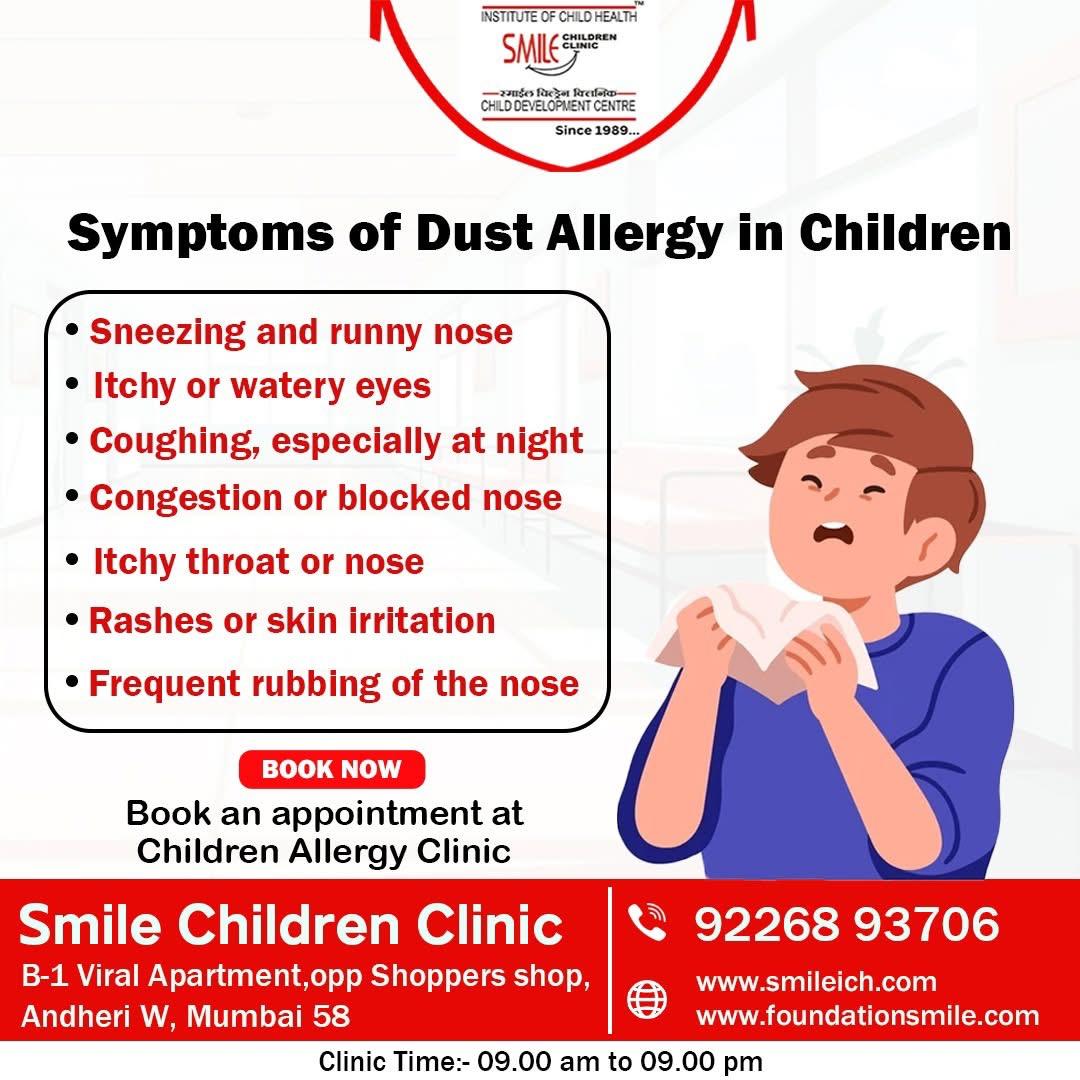
Children Allergy
Allergies in Children: What Mumbai Parents Need to Know
Over last 3 decades of Paediatric practice, we have realised that allergies in children have become a growing concern, not only globally but also in Mumbai. With its changing climates, pollution, and lifestyle shifts, children specialist doctors in Mumbai are seeing more and more kids with allergy problems. Here’s what parents in Mumbai ask our child specialist, from early detection to effective management of childhood allergies.
1. Doctor, how often are you seeing allergies in children?
- Global trend: Up to 35 % of children now experience some form of allergic disease—food allergy, eczema, asthma or rhinitis—compared to much lower numbers 20 years ago .
- Environmental factors: Urban pollution, reduced exposure to microbes, processed diets, and indoor lifestyles all contribute to a rise in allergic conditions. In India, and specially in our Mumbai city, pollution—a known trigger—increases the risk of allergy.
2. Which are common childhood allergies?
- Food: Cow’s & buffalo milk, eggs, peanuts, soya, wheat are common food allergies in kids. Mumbai’s love for diverse cuisine means hidden risks!
- Inhalant (Lung allergy): Dust mites present in our linen and dust, mould or fungi in moist areas, cockroaches, pollens, pet dander—common in urban dwellings.
- Skin: Atopic dermatitis (eczema) is often the first sign in infants; one in six children, globally, can have eczema. This is the second most common (first being children asthma) allergy we see in kids.
3. Why early detection matters? I heard you can’t cure allergies in children.
You heard it right, often we can’t!
- Allergies affect up to 35 % of children, with geneenvironment ‘sensitization’ playing an important role .
- Early exposure to allergens during a maturing & developing immune system can shape future reactions. Avoidance alone isn’t always protective; instead, moderation and cautious introduction help reduce allergy development.
- Also we end up giving many treatments with antibiotics and what not, to kids where allergy diagnosis didn’t happen. Once we know it is allergy we save on time, effort and money being spent on alternative diagnosis!
4. Timely and early introduction of some allergens helps prevent allergies, is it true?
There are few trials showing that.
- The LEAP study (peanut prevention) showed early feeding of peanut products early on in life reduce allergy risk. AAP and IAP now support early introduction for high-risk infants.
- Research also suggests feeding diverse foods in the first year may strengthen gut health and tolerance.
- Some studies advise a balance between allergen exposure and microbiome- friendly lifestyle—less sterilization, more fresh air.
5. How to recognize allergy vs. infection?
This is the most important aspect as it leads to irrational and excessive antibiotics use in children.
- A Times of India report notes that monsoon in Kolkata brings overlapping viral and allergy symptoms. Allergies often strike suddenly, cause morning congestion, and lack fever—unlike viral infections. Paediatricians at Smile Children clinic will easily separate these out!
- Tip for parents: persistent morning sneezes or congestion—not followed by fever—could be allergy, especially in dusty or Mold-prone homes.
- At our Child Asthma Centre, we see Asthma patients often coming to us with multiple courses of antibiotics already taken!
6. One a boy in my child’s school had a severe allergic reaction. I was scared?
- Anaphylaxis (e.g. to milk or nuts or medicines) is life-threatening and must be treated urgently with adrenaline injection. And ask school authorities, if they keep one handy?
- A recent tragic case in the UK (milk allergy death) highlights delayed EpiPen use and poor school protocols —a stark reminder for Mumbai schools and daycare centres to have action plans and trained staff.
- Empower yourself: educate yourself, insist on allergy-aware school policies, and make sure emergency medications are available.
7. Can I understand some prevention & management ideas for children allergy?
- Family history: Keep doctors informed—children with allergic parents are at higher risk .
- Diet: Follow IAP guidelines of introducing solids between 4–6 months.
- Home environment: Dust-mite covers, regular cleaning, dehumidifiers to prevent Mold, avoid carpets where possible.
- Evaluation: Some blood tests like IgE panels to confirm suspected allergies.
- Medicines: Paediatricians at Smile Children Clinic in Andheri, Mumbai will guide you on antihistamines, nasal corticosteroids and inhalers on whether they are needed or not and how to use them safely and without any side effects.
- Immunotherapy: AAP and AAAI recognize allergy shots/tablets can modify long-term risk—particularly for rhinitis and asthma.
Provide a written allergy action plan with clear steps for reaction and ensure staff know EpiPen use, symptoms of anaphylaxis, and emergency procedures.
8. Any specifics of childhood allergic problems in the Mumbai context?
- Monsoon increases dust mite and mould exposure—time to ramp up home allergy controls.
- Awareness of severe reactions needs to reach every corner: in public schools, at parties, on outings.
- Smile Children Clinic can host parent workshops on first-aid, EpiPen training, and allergen-free diets.
- Allergies symptoms can be mild like sneezes, rashes—but can escalate. Early insight, smart prevention, and community awareness are our best defences.
At Smile Children Clinic, Andheri, we’re here to guide your family and schools through every step—diagnosis, treatment, personalized advice—to ensure your child’s childhood remains bright and healthy.
